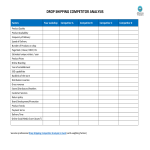Real Estate Competitor Analysis
Save, fill-In The Blanks, Print, Done!

Download Real Estate Competitor Analysis
Adobe Acrobat (.pdf)- This Document Has Been Certified by a Professional
- 100% customizable
- This is a digital download (37.4 kB)
- Language: English
- We recommend downloading this file onto your computer.
Are you looking for a professional Real Estate Competitor Analysis? If you've been feeling stuck or lack motivation, download this template now!
When you are in a business or trying to accomplish a project, you will always meet competition. And this is a curse and a blessing. Therefore, it’s also important to keep an eye on the close competition, what that competition is up to, you could be missing out on huge opportunities and can learn from them. This Real Estate Competitor Analysis template can help you find inspiration and motivation and covers the most important topics that you are looking for and will help you to structure and communicate in a professional manner with those involved.
For this reason, performing a competitive analysis is so crucial to your success as a business. It gives you the tools to quickly adapt to any changes in the competitive landscape and potentially capitalize on industry trends that your competitors have not even noticed. When you make competitive analysis, you compare and analyze the strengths and weaknesses of your competitors compared to those of your own business.
Naturally, a competitive analysis report will contain:
- your business’s target market description;
- distinctive characteristics of your product compared to your competitors’ products;
- comparisons of pricing models;
- breakdown of current and projected market share, sales, and revenues;
- analysis of marketing strategy and social media strategy;
- description of customer ratings of the features of each competitor.
COMPETITIVE STRATEGY AND REAL ESTATE DEVELOPMENT REMARKS TO THE HARVARD BUSINESS SCHOOL REAL ESTATE SYMPOSIUM
The real estate industry is an industry in which many of you will have to make some choices about how you will compete in the future. The question in the real estate development industry is what has been the nature of the industry historically and how has it been changing I think it has been pretty clear in the past that, with the exception of some seismic tremors, it has been a relatively attractive industry.. Porter Harvard Business School tenants looked at what they could get in a new project and compared it with what they could get in their current building, which was hard to heat and cool, and awkward to work in, and they chose new construction.. How should you position yourself If you accept this notion that the industry is getting less attractive, has become less attractive and that it is permanent and not just an overcapacity problem that will go away in a couple of years, then how should you deal with that How is your company going to be a superior performer In every industry there is a distribution of profits.
What’s the essential kind of advantage that you are going to seek Are you really seeking lower costs because you are going to be more efficient Or are you going to try and differentiate yourself You may spend a lot of extra money trying to do that.
Feel free to download this intuitive template that is available in several kinds of formats, or try any other of our basic or advanced templates, forms, or documents. Don't reinvent the wheel every time you start something new...
Download this Real Estate Competitor Analysis template and save yourself time and effort! You will see completing your task has never been simpler!
DISCLAIMER
Nothing on this site shall be considered legal advice and no attorney-client relationship is established.
Leave a Reply. If you have any questions or remarks, feel free to post them below.
Related templates
Latest templates
Latest topics
- GDPR Compliance Templates
What do you need to become GDPR compliant? Are you looking for useful GDPR document templates to make you compliant? All these compliance documents will be available to download instantly... - Google Docs Templates
How to create documents in Google Docs? We provide Google Docs compatible template and these are the reasons why it's useful to work with Google Docs... - IT Security Standards Kit
What are IT Security Standards? Check out our collection of this newly updated IT Security Kit Standard templates, including policies, controls, processes, checklists, procedures and other documents. - Letter Format
How to format a letter? Here is a brief overview of common letter formats and templates in USA and UK and get inspirited immediately! - Google Sheets Templates
How to work with Google Sheets templates? Where to download useful Google Sheets templates? Check out our samples here.
cheese



